The Crucial BX200 (480GB & 960GB) SSD Review: Crucial's First TLC NAND SSD
by Billy Tallis on November 3, 2015 9:00 AM ESTSequential Read Performance
Just like the random read test, sequential reads are tested across the span of a full drive and a representative sample of queue depths. This test performs 128kB reads. Most operations involving large files (typically images and videos) fall under this test's purveiw, but streaming or playing even the highest resolution videos doesn't require anywhere near the full bandwidth of a SSD. Copying files to another SSD or loading very large files into an editing program will more likely use all the speed that's available.
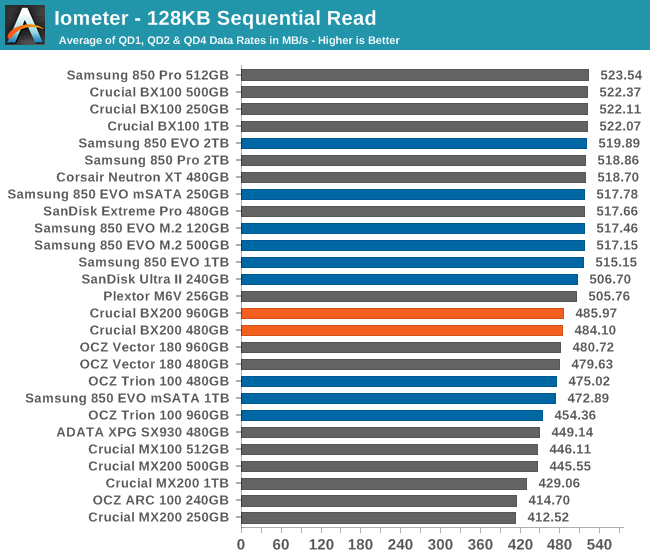
At last we see respectable performance from the BX200. Its sequential read speeds aren'te quite up to the SATA limit at low queue depths, but it can sustain solid performance. Unfortunately, for anyone holding out hope that the poor results we've seen so far may be a testbed issue, the otherwise respectable sequential performance puts that idea to rest.
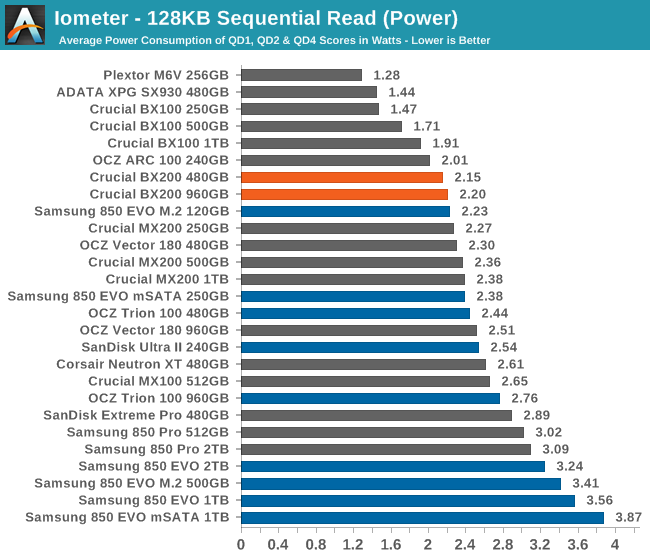
Power consumption on sequential reads is actually good, though it won't catch up with the best of drives.
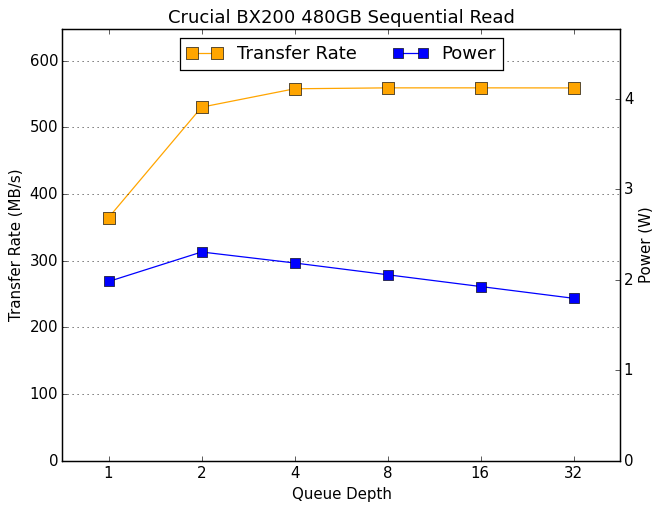 |
|||||||||
| Default | |||||||||
Given a larger queue depth, the BX200 is actually able to reach the performance plateau of the SATA speed limit; it just takes a little longer than the top tier of drives. Given the performance, it's not surprising to see that power consumption doesn't grow much. The shallow but steady decline in power consumption for the 480GB drive may be a sign that it's able to do some prefetching and caching to reduce the number of times it has to read from the flash.
Sequential Write Performance
The sequential write isn't limited to a small span of the disk, as that usually doesn't make a difference for this performance metric. As always, our averages are of the lower queue depths, but scaling to higher queue depths is also investigated. Bulk file copies and recording uncompressed video are the kind of uses that depend on sequential write performance.
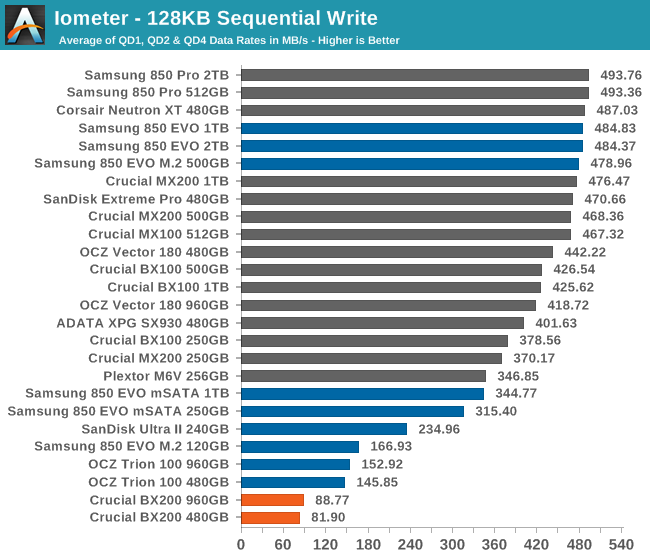
The initial good news we saw with the BX200's sequential read performance didn't last long. The drive's write performance is bad for sequential access just like random access, unfortunately displacing the Trion 100 as one of the worst drives in our current collection.
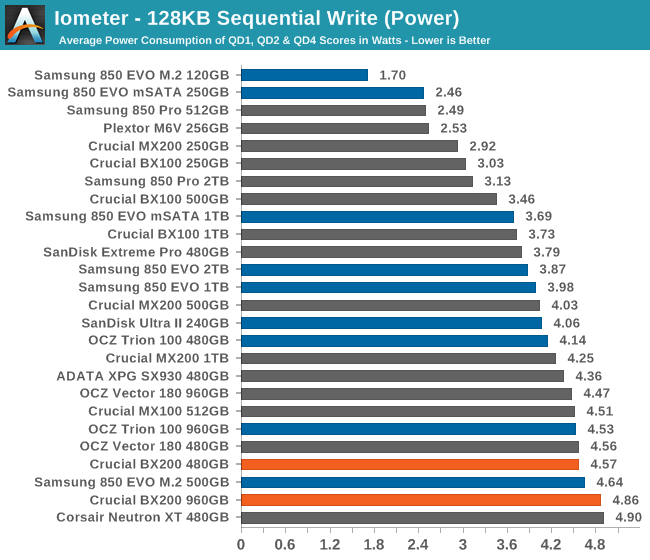
The BX200 power consumption during sequential writing is poor but not radically so. It would seem that Micron's TLC flash requires at most a little more power to write to than other TLC, and this drive is just wasting most of that power budget on background management.
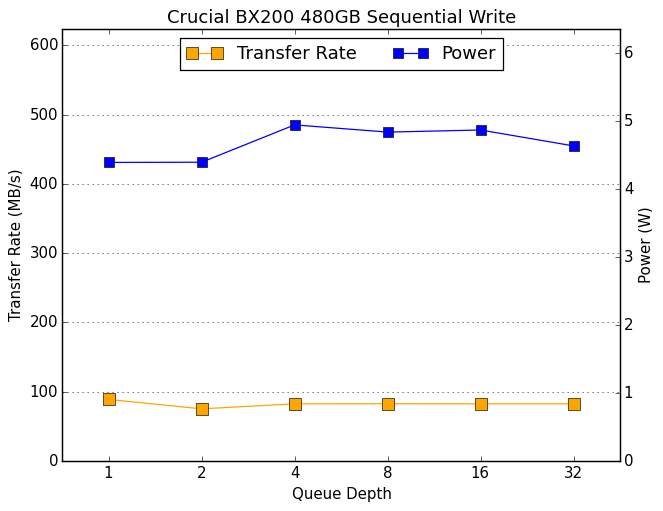 |
|||||||||
| Default | |||||||||
Looking at larger queue depths, performance drops slightly after QD1, and stays low as power consumption shifts around some but is always high. Neither capacity of the BX100 can sustain even 100MB/s of writes for a length of time.










85 Comments
View All Comments
redzo - Wednesday, November 4, 2015 - link
It's a disaster. I think that Crucial was better of not releasing the damn thing. What were they thinking? The performance gap is huge compared to samsung's evo. This product just shows that samsung rules TLC. All educated buyers will think twice before purchasing it even at 15/20$ lower than this.KAlmquist - Wednesday, November 4, 2015 - link
What makes it a disaster is that Crucial is replacing a successful product (the BX100) with this thing. Keep the BX100 around, give the new drive a designation like AX100, market it as a budget alternative to the BX100, and the drive might be a modest success.When the BX100 disappears, that will leave the Samsung 850 EVO as the paradigm of the SATA SSD sweet spot, with good balance of performance, quality, and attractive pricing.
paulgj - Monday, November 9, 2015 - link
They should name it the BX50 :-)tabascosauz - Wednesday, November 4, 2015 - link
The BX200 should be compared to the SP550 from ADATA. Both are budget drives, both SM2256 (which has left a much crappier first impression than the actually promising SM2246EN), both TLC, yet the SP550 does better as a budget drive.KAlmquist - Friday, November 6, 2015 - link
Yup. I would be excited about the performance of the BX200 if I worked for ADATA.Dritman - Wednesday, November 4, 2015 - link
This is actually embarrassing, to put this product into today's market, at any price. You cannot step backwards THIS far.A crap review is like one of the cheap OCZ drives, except they're understandably bad, because they're so cheap and kinda in line with the price.
With this thing though, it's much worse than anyone could have imagined.
bennyg - Tuesday, November 10, 2015 - link
80mb/s sequential write is not that bad in a SSD. If it were made in 2009.TonyCL6 - Friday, November 6, 2015 - link
The comparison chart should add Samsung 840EVO (planer 19nm TLC) and ADATA SP550 (planer Hynix 16nm TLC) to be more meaningful. It helps users understand the sustain Seq. write (after pSLC cache ran out) performance differences between planer TLC of Samsung 19nm, Toshiba 19nm, Hynix 16nm and Micron 16nm.Kutark - Sunday, November 15, 2015 - link
Can someone answer a question for me. It says these are capable of roughly 500MB/s read and write, however SATA3 obviously saturates around 200. Are those figures for m.2 PCIE versions of the drive or? Cus I see them advertised for the 2.5" SATA drives and im a little confused.I was about to build a skylake setup as a Christmas gift to myself, however I was looking at some of the NVMe drives etc, to get better perf than SATA3 can offer, however, they're significantly more expensive per GB. So, if I can get something with a sustained 500 read/write like this, (or maybe a "pro" version, i.e. non NVME) I'd rather save the money, as realistically in a gamer situation the difference between 500mb/s and 1000 is gonna be negligible.
NJCompguy - Tuesday, January 19, 2016 - link
Despite the abysmal performance of this drive, it's still light years faster then a 5400RPM mechanical drive. I picked up this drive (240GB version) for $65.00 - it made my friends laptop feel brand new after installing a fresh copy of Windows 10. She could not have been happier with this drive. People to often get caught up in the technical details and lose sight of the "big picture" of upgrading from a slow hard drive to an SSD. This drive is perfect for those that just want a laptop to boot up quicker.